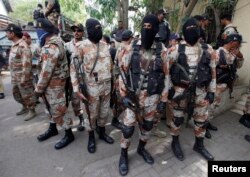VOA's Asad Hassan and Ayaz Gul contributed to this story.
Prominent opposition parties in Pakistan have demanded a debate in Parliament over the possible reinstatement of military courts and have called for them to be disbanded, deeming them "illegal" and "unconstitutional."
The courts' two-year term ended Sunday and the government reportedly is considering a two-year extension, arguing they have been effective in prosecuting terror suspects.
Farhat Ullah Babar, a senior leader of the Pakistan Peoples Party (PPP), however, said his party believes there is no longer a need for military courts in Pakistan and their existence is unconstitutional.
"We simply say no to military courts. There has been a decline in terrorism in the country and we need to know why do we still want military courts," Babar told VOA.
"They are a violation of our constitution. ... PPP wants the Parliament to be taken into consideration and confidence to have a debate about why the government is willing to reinstate the military courts," he added.
Khaqan Abbassi, Pakistan's former prime minister and a key member of the Pakistan Muslim League Nawaz (PMLN) party, which was in power before the current government, also spoke against military courts while talking to reporters last week.
"If the government wants an extension to the military courts, it will have to take the opposition parties in confidence," Abbassi said, meaning it would have to take up the issue with them.
Action plan
The military courts were reinstated in 2015 under the National Action Plan, or NAP. The plan, aimed at addressing growing militancy, was a response to a 2014 terrorist attack on an army public school in Peshawar, the capital of Khyber Pakhtunkhwa province. More than 200 people, including 151 civilians, were killed and 200 others wounded.
The Pakistani Taliban, a U.S.-designated terror group, claimed responsibility.
The justification for military tribunals at the time was to expedite the trials of suspects arrested on terrorism charges and to provide protection to witnesses who hesitated to testify in civil courts, fearing retaliation from militant groups.
Now, four years later, concerns over the legality and the need for these tribunals are being raised, as Prime Minister Imran Khan's government consults different opposition parties to push for legislation to extend the courts for another two years.
In order for the courts to resume their work, both the lower and upper houses of Parliament would have to vote for a constitutional amendment. They extended the courts once for two years in 2017.
Mehdi Hassan, a Pakistan-based human rights activist and political analyst, believes the security situation has improved, comparing the situation to what it was in 2014. Hassan says there is no longer a need for military courts.
"The opposition has taken a stand and they believe the circumstances have changed regarding terrorism in Pakistan. When the military courts were formed, the country was facing an immense terrorism threat, but that is not the case anymore," Hassan told VOA.
Other analysts, who are advocating for the courts, charge they have been effective and a good alternative to the slower civil courts.
"There is friction between government and opposition parties. They should put aside their differences and come to a consensus regarding the military courts because it is for the betterment of the country. This is in the interest of the country that we need to have military courts for the next few years," Muhammad Ali Ihsaan, a former military official and a defense analyst, said.
"We are not part of a developed world. Our problems are different, and we are at the forefront of the war against terror," he added.
Secrecy concerns
Rights groups and experts have raised concerns over the secret nature and operations of these courts, with some labeling them as a parallel judiciary.
"There is no doubt about complications regarding the military courts and the way they operate. If the government wants to reinstate these courts, it should [do so through appealing to the will of the people]," Hassan said.
"In 2015, the whole nation was in shock after the school massacre and politicians felt compelled to pass the amendment to allow military tribunals to work," Shama Junejo, a rights activist who opposes these courts, told VOA.
Earlier this year, a global watchdog for justice called on Pakistan not to use military courts to try civilians for terrorism-related offenses, saying that doing so amounted to rights violations.
The International Commission of Jurists (ICJ) said in January that military tribunals have committed serious fair trial violations.
In a statement, the ICJ listed "serious fair trials violations in the operation of military courts, including: denial of the right to counsel of choice; failure to disclose the charges against the accused; denial of a public hearing; a very high number of convictions — more than 97 percent — based on "confessions" without adequate safeguards against torture and ill treatment."
Military's defense
Pakistan's military says the courts have been effective in the war against terror in the country.
Maj. Gen. Asif Ghafoor, Pakistan's military spokesperson, said in January that the courts were still needed.
"Military courts instilled fear in terrorists, and a remarkable decline in terrorism-related incidents was seen after the military courts [were established],” he told ARY News, a Pakistani news channel.
The exact number of these courts in the country is still not known, but according to local media reports, several such courts had remained active in the past four years, including three in Punjab, two in Sindh, three in Khyber Pakhtunkhwa and one in Balochistan province.
According to the Pakistani military, the federal government referred 717 cases to these courts over the past four years. The courts handled 546 cases and handed over death sentences to 310 suspects.






